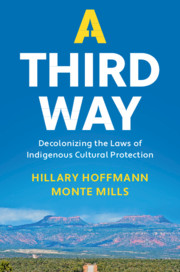Book contents
- A Third Way
- A Third Way
- Copyright page
- Dedication
- Contents
- Figures
- Preface
- Acknowledgments
- Introduction
- 1 Legal History and Foundations
- 2 The Jurisdictional Framework of the Second Way and the Cherokee Diaspora
- 3 Religious Freedom, the Value of Sacred Places, and the Price of Cultural Ignorance
- 4 Clashing Values, the Blackfeet, and a Measure of Success in the Badger-Two Medicine
- 5 Federal Cultural Protection Statutes
- 6 Tribal Laws
- 7 Both Ends of the Spectrum and Everything in Between
- 8 Indigenous Cultures and Intellectual Property
- 9 A Third Way for the Future
- Index
6 - Tribal Laws
The Embodiment of the Third Way
Published online by Cambridge University Press: 16 July 2020
- A Third Way
- A Third Way
- Copyright page
- Dedication
- Contents
- Figures
- Preface
- Acknowledgments
- Introduction
- 1 Legal History and Foundations
- 2 The Jurisdictional Framework of the Second Way and the Cherokee Diaspora
- 3 Religious Freedom, the Value of Sacred Places, and the Price of Cultural Ignorance
- 4 Clashing Values, the Blackfeet, and a Measure of Success in the Badger-Two Medicine
- 5 Federal Cultural Protection Statutes
- 6 Tribal Laws
- 7 Both Ends of the Spectrum and Everything in Between
- 8 Indigenous Cultures and Intellectual Property
- 9 A Third Way for the Future
- Index
Summary
In his seminal 2005 book Blood Struggle: The Rise of Modern Indian Nations, Indian law scholar and prolific tribal advocate Charles Wilkinson profiled the remarkable rebirth of tribal sovereignty and political influence in the decades after the dark 1950s termination era. In conjunction with this renaissance, Wilkinson identified the “great irony of the twentieth century … that contemporaneously with the rise of Indian entrepreneurship in general and gaming in particular, Indian people experienced a resurgence in traditionalism.” The rise of tribal governments and the recognition of their sovereign authority (internally and externally) “released a surge of cultural pride,” and energized tribal legal, political, sovereign, and community priorities revolving around cultural identity and protection. Wilkinson explained this connection between culture and sovereign responsibility: “Indian people … have their private ways, but there is also a more formal governmental aspect to the cultural revival, tasks that go with the obligations of sovereignty.”
- Type
- Chapter
- Information
- A Third WayDecolonizing the Laws of Indigenous Cultural Protection, pp. 94 - 112Publisher: Cambridge University PressPrint publication year: 2020



